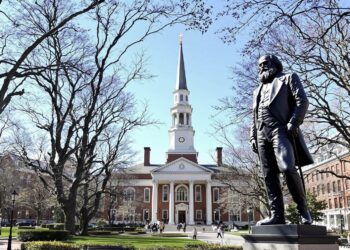In a revealing discussion on social media censorship and election interference, Ben Harnwell and Mike Davis dissected recent news that showed Americans they should be very skeptical of the Democrats when they are in power. The news broke Monday that Mark Zuckerberg, CEO of Meta, admitted to censoring information on his platform, formerly known as Facebook, regarding Hunter Biden’s infamous laptop—a move that many argue constituted a deliberate attempt to sway public opinion toward Democrat Joe Biden, during the 2020 election.
This admission has reignited fierce debates about Big Tech’s role in moderating content and its implications for democracy ahead of the looming November elections.
“You remember this—where the majority of the American people said, had they known that the laptop from hell was genuine, that would have changed their vote,” Harnwell told Davis about the poll reported by Paul Sperry.
The news broke on Monday that Americans had been denied important election information:
Mark Zuckerberg just admitted three things:
1. Biden-Harris Admin "pressured" Facebook to censor Americans.
2. Facebook censored Americans.
3. Facebook throttled the Hunter Biden laptop story.
Big win for free speech. pic.twitter.com/ALlbZd9l6K
— House Judiciary GOP 🇺🇸🇺🇸🇺🇸 (@JudiciaryGOP) August 26, 2024
During their conversation, Harnwell and Davis highlighted how Zuckerberg’s acknowledgment of content suppression could have fundamentally altered the outcome of the 2020 presidential election.
Davis noted, “The federal government was putting pressure behind the scenes on a social media platform.”
This revelation raises significant concerns about governmental overreach and the manipulation of information critical to voters.
The controversy centers on the now-infamous Hunter Biden laptop story first exposed by Steve Bannon on the WarRoom, which surfaced in the weeks leading up to the 2020 election. The laptop, purportedly containing sensitive and potentially incriminating information about Joe Biden’s son, was initially dismissed by major news outlets and social media platforms as Russian disinformation. However, subsequent investigations confirmed its authenticity, leading to questions about why it was so vehemently suppressed.
Davis emphasized the gravity of this censorship, stating, “I can’t think of anything more dangerous and anti-democratic than the federal government putting their hands around the neck of a trillion-dollar, Big Tech monopolist… and essentially coercing that Big Tech monopolist… to censor so-called COVID misinformation.”
He extended this argument to the Hunter Biden laptop case, illustrating how similar tactics were used to control the narrative and protect political interests.
The crux of the issue, according to Davis, is the collusion between Big Tech companies and government officials, particularly under the Biden administration. He claimed, “The Biden regime is colluding with these Big Tech platforms to censor Americans, and somehow that’s not election interference?” This rhetorical question underscores the hypocrisy perceived by many critics who view the selective enforcement of information control as an outright attack on free speech and democratic processes.
Davis argued that the censorship of the Hunter Biden laptop story likely had a significant impact on voters’ decisions. “You remember this—where the majority of the American people said, had they known that the laptop from hell was genuine, that would have changed their vote,” he asserted, referencing polls indicating that many Americans felt misled by the suppression of this critical information. He posited that the intentional silencing of the story amounted to election interference, affecting the integrity of the electoral process.
The conversation also touched on the broader implications of Big Tech’s gatekeeping power over information. Davis called for a renewed focus on antitrust actions against tech giants like Facebook, Google, Amazon, and Apple to prevent them from having undue influence over public discourse and political outcomes. He argued, “We need to break them up so they do not have gatekeeping power over information and commerce, and the federal government doesn’t hijack or commandeer their gatekeeping power.”
As the discussion unfolded, it became clear that Davis and Harnwell view this issue as a pivotal moment in the battle for free speech and fair elections. The use of censorship by social media platforms, especially when influenced by governmental pressure, represents a dangerous precedent that could erode public trust in democratic institutions.
Zuckerberg’s admission that Facebook suppressed the Hunter Biden laptop story has opened a Pandora’s box of ethical and legal questions. The revelation that this act was part of a broader pattern of content moderation influenced by political considerations has sparked outrage and calls for accountability.
As Davis remarked to Harnwell, “When these Big Tech platforms collude with the federal government to censor Americans, they are violating federal law.” This stark assessment reflects a growing concern that the democratic ideals of free speech and open debate are under siege by a powerful coalition of political and corporate interests.
For more context, watch this two-part interview with Mike Davis:





